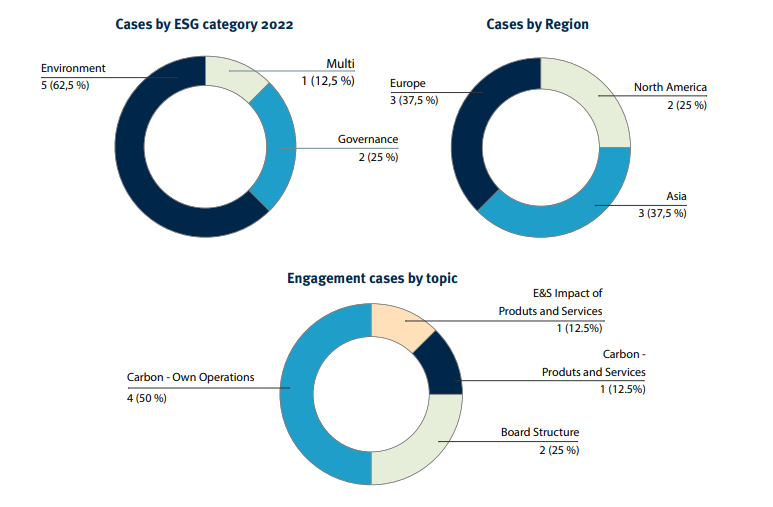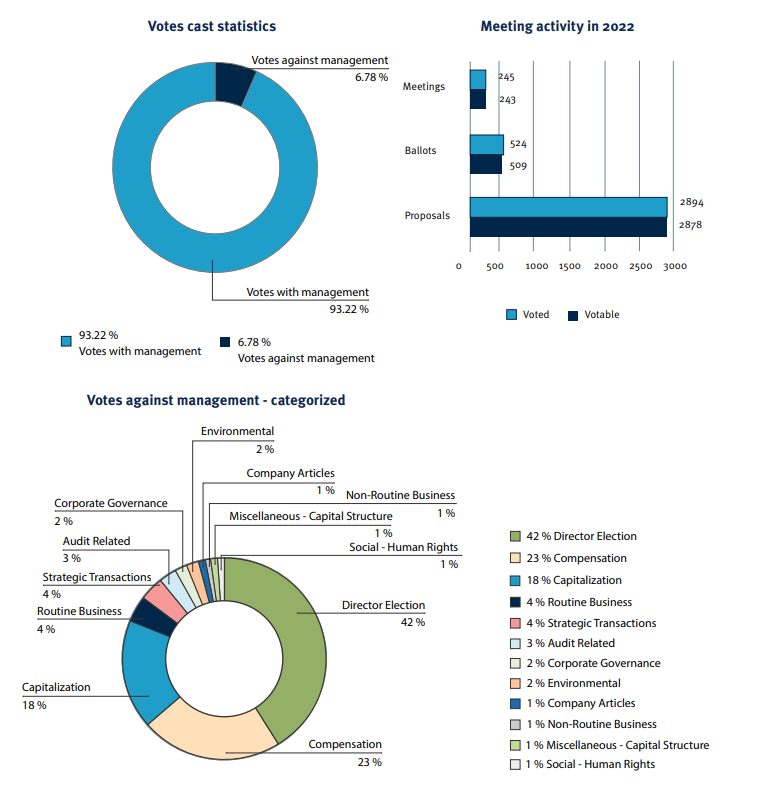We get to know the companies we invest in and offer our advice on improvements. Before deciding to invest in a company, we must have conviction in what that company is doing and trust that it will deliver value.
Our 2022 engagement activity
Our engagement activity in 2022 was lower than in previous years. While Russia's illegal war against Ukraine would have been a very necessary catalyst for considerable engagement with Russian holdings, an early group-wide decision to divest from all Russian holdings negated the need for stewardship dialogue. In addition, the general market upheaval induced by the crisis, coupled with turbulent markets and labour-intensive efforts to implement SFDR requirements, further stretched the resources of the portfolio team.
In total, SKAGEN engaged with eight companies during 2022, whereby half of the engagement activity focused on direct carbon emissions.
Environment-related engagement
Environment-related ESG engagements made up the largest category of dialogues in 2022 with the focus being on transition pathways and decarbonisation. Environment-related engagements made up 62.5% of all ESG engagements during 2022.
The ESG team is currently collaborating with SKAGEN Focus on a project to gain a deeper understanding of the top-emitting holdings measured by carbon intensity and their transition pathways. The aim of the engagement dialogues with these companies is to collect data and information, as well as deepen our knowledge of the companies' efficiency plans and targets. The engagement activity mirrors global investment activity, where engagement dialogue was held with companies in Asia, North America, and Europe.
Governance-related engagement
Governance-related ESG engagements made up 25% of dialogues in 2022 with the focus being on topics that are generally of importance to minority shareholders. The governance-related engagements in 2022 have been board structure related, namely proposing increased independence and diversity in board structures.
Multi-category engagement
Lastly, multi-category dialogues are becoming a more central feature of our engagement dialogue with companies. These dialogues are more holistic, spanning the full range of ESG topics. These dialogues are sometimes also multi-tiered in the sense that SKAGEN will not only engage with the company but also with third parties e.g., ESG data providers. There are select openings where SKAGEN, as a value investor with small and mid-cap exposure, is able to provide added value for such companies by offering guidance and recommendations on how to improve ESG disclosure scores towards data providers and to the market more broadly.

Voting activities
In SKAGEN we believe in exercising our rights as shareholders. Proxy voting gives us the opportunity to vote without being physically present at meetings. As active investors we feel that it is important to vote in order to address concerns and influence companies in a direction that we believe is sustainable.
Despite the fact that there was less activity engaging directly with companies in 2022, SKAGEN was able to maintain our voting activity at Annual General Meetings and Extraordinary General Meetings. In 2022, there were 245 voteable meetings and 524 voteable ballots in the portfolio companies with 2,894 voteable items on the agenda. SKAGEN voted on 99.45% of the items and against management on 6.78% of all voted items.
The 2022 voting season received a lot of attention with several parties noting the politicisation of shareholders in US listed companies. In general, it seems to be an emerging shift that shareholders are more on the offensive in filing shareholder resolutions on specific ESG matters, often as part of an escalation strategy in their stewardship activity.
SKAGEN often supports these resolutions but will also vote against them in cases where we believe the proposed resolutions are wrong-footed. Examples of the latter may include: 1) failing to disclose financial materiality/harming shareholder value, 2) micromanagement of Boards, 3) proposing items and efforts for which the company in question has already communicated targets and goals.
As an example of a case where we supported shareholder resolutions, we voted against the management of Citigroup and aligned with investors in instructing the Board to improve their human rights standards. Given Citi's poor ESG history, SKAGEN believes increased disclosure that evaluates the effectiveness of Citi's due diligence around Indigenous Peoples' rights for project-related financing and client portfolios will help reduce the financial risk from further reputational damage.
Irrespective of the broader trends, these more specific ESG shareholder resolutions make up a minute proportion of the total items voted on. In our experience, ensuring robust and effective governance is a prerequisite for companies to excel on more specific environmental or social targets. This is in turn vital in securing the long-term interests of shareholders.




